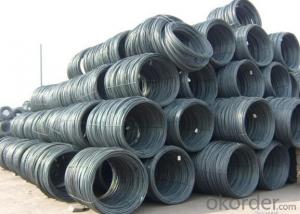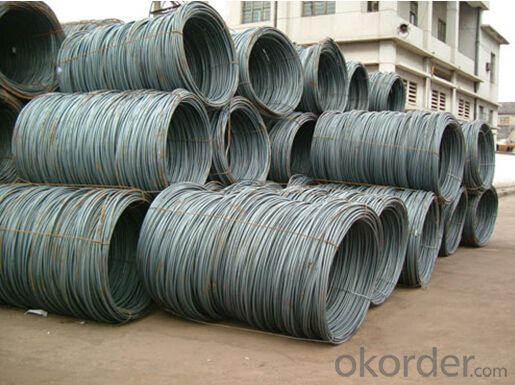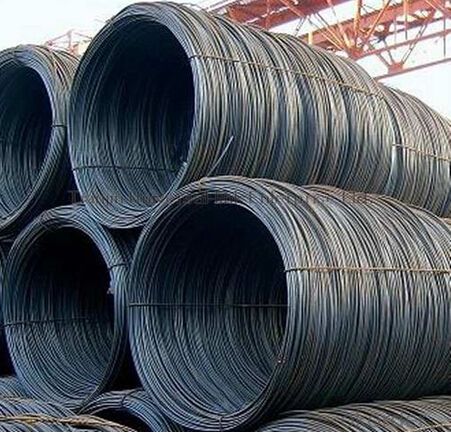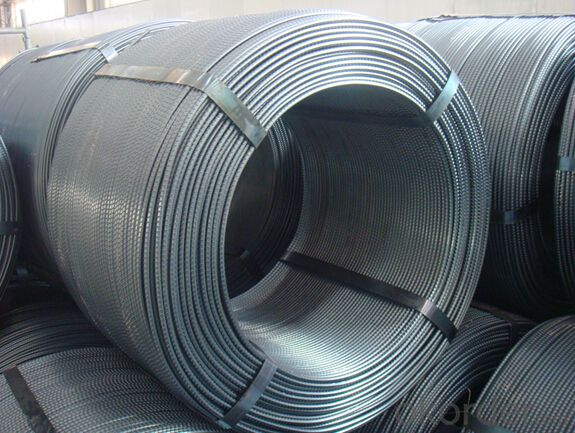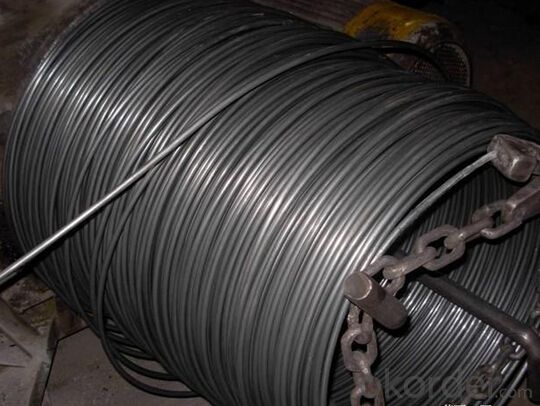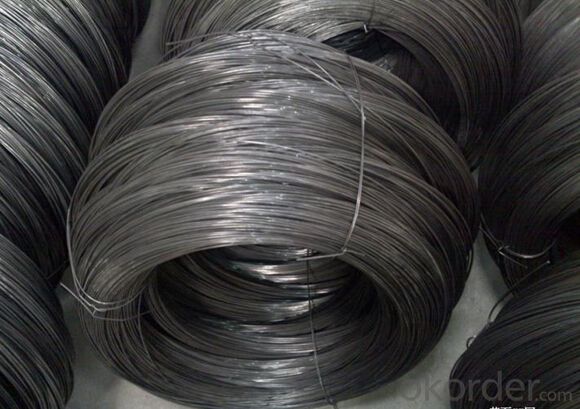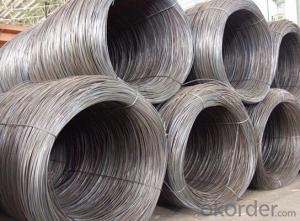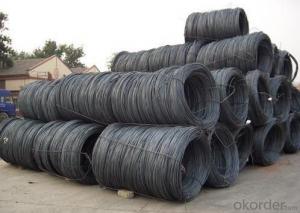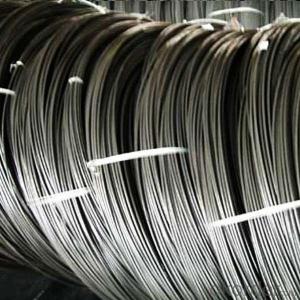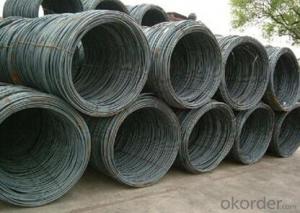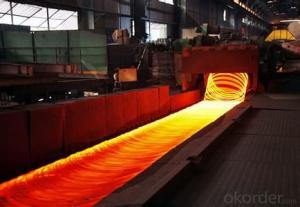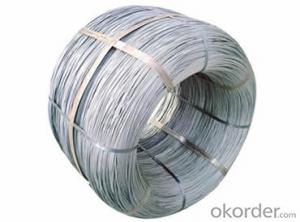Hot rolled Steel Wire Rod in coils Q195 High Speed Wire Rod
- Loading Port:
- Tianjin
- Payment Terms:
- TT OR LC
- Min Order Qty:
- 10 m.t.
- Supply Capability:
- 10000 m.t./month
OKorder Service Pledge
OKorder Financial Service
You Might Also Like
Specification
Hot rolled Steel Wire Rod in coils Q195 High Speed Wire Rod
Details of Hot rolled Steel Wire Rod in coils Q195 High Speed Wire Rod
| Steel Grade | Q195-Q235,Q235,SAE 1008-1018 Hot Rolled Steel Wire Rod |
| Diameter | 5.5, 6.5, 7,8, 9,10, 12,14mm.etc. |
| Coil weight | 2m.t. |
| Application | drawing, construction materials, machinery parts,construction for Houses, Bridges, Roads,Packing |
| Deliver Time | 25-30 days after receipt of L/C or deposit by T/T |
| Packing | In coils, loading in container or by bulk vessel |
| Payment terms | 1).100% irrevocable L/C at sight. |
| 2).30% T/T prepaid and the balance against the copy of B/L. | |
| 3).30% T/T prepaid and the balance against L/C |
| Chemical Composition(%) | ||||||
| C | Mn | Si | S | P | Cr | |
| SAE1006B | 0.03~O.07 | ≤0.32 | ≤0.30 | ≤0.045 | ≤0.040 | 0.3-0.35 |
| Mechanical properties | ||||||
| Yield strength(N/mm2) | Tensile strength(N/mm2) | Elongation(%) | ||||
| 250-280 | 350-380 | ≥32 | ||||
| Grade | Chemical Composition(%) | |||||
| C | Mn | Si | S | P | Cr | |
| SAE1008B | 0.10max | 0.3~O.50 | 0.15max | 0.050max | 0.040 max | 0.3-0.35 |
| Mechanical properties | ||||||
| Yield strength(N/mm2) | Tensile strength(N/mm2) | Elongation(%) | ||||
| ≥195 | 315-430 | ≥30 | ||||
Supplier of the Hot rolled Steel Wire Rod in coils Q195 High Speed Wire Rod
CNBM International Corporation is the most import and export platform of CNBM group(China National Building Material Group Corporation) ,which is a state-owned enterprise, ranked in 270th of Fortune Global 500 in 2015.
With its advantages, CNBM International are mainly concentrate on Cement, Glass, Iron and Steel, Ceramics industries and devotes herself for supplying high quality series of refractories as well as technical consultancies and logistics solution.
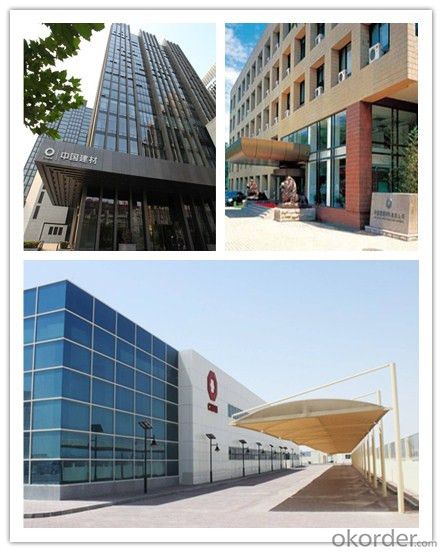
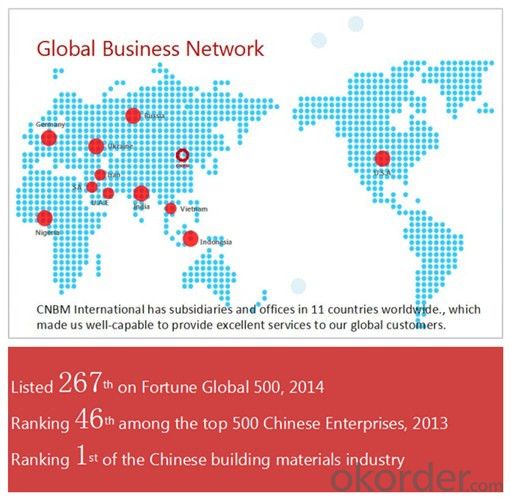
Delivery of the Hot rolled Steel Wire Rod in coils Q195 High Speed Wire Rod
Packaging Detail | Sea worthy packing /as per customer's packing instruction |
Delivery Detail | 15 ~ 40 days after receiving the deposit |
Products Show
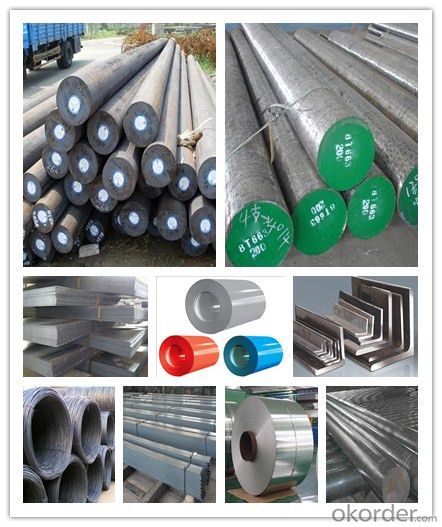
FAQ:
Are you a trading company or manufacturer? | Manufacturer |
What’s the MOQ? | 3 metric ton |
What’s your delivery time? | 15-35 days after downpayment received |
Do you Accept OEM service? | Yes |
what’s your delivery terms? | FOB/CFR/CIF |
What's the Payment Terms? | 30% as deposit,70% before shipment by T/T |
Western Union acceptable for small amount. | |
L/C acceptable for large amount. | |
Scrow ,Paybal,Alipay are also ok | |
Why choose us? | Chose happens because of quality, then price, We can give you both. Additionally, we can also offer professional products inquiry, products knowledge train (for agents), smooth goods delivery, excellent customer solution proposals. |
What's your available port of Shipment? | Main Port, China |
What’s your featured services? | Our service formula: good quality+ good price+ good service=customer's trust
|
Where are your Market? | Covering more than 160 countries in the world |
- Q: What are the applications of special steel in the food processing industry?
- Due to its unique properties and characteristics, special steel finds wide-ranging applications in the food processing industry. One significant use of special steel in this sector is for manufacturing equipment and machinery used in food processing plants. Its corrosion resistance and ability to withstand extreme temperatures make it ideal for frequent sanitization and operation under harsh conditions. Special steel is commonly employed in the production of blades, knives, and cutting tools used in food processing. Its high strength and durability enable these tools to maintain their sharpness and effectiveness even after prolonged use, ensuring efficient and precise cutting of food products. Another application of special steel in the food processing industry is for constructing storage tanks and containers. These tanks are utilized for storing and transporting various food products. The corrosion resistance and hygiene properties of special steel prevent contamination and ensure the quality and safety of the stored food. Moreover, special steel is also utilized in the construction of processing machinery, such as mixers, grinders, and extruders. Its high strength and stability enable these machines to handle the rigorous demands of food processing, ensuring smooth operation and minimizing downtime. Furthermore, special steel often finds application in the production of conveyor systems used in food processing facilities. These conveyors play a crucial role in moving food products along the processing line, and special steel's resistance to wear and tear ensures efficient and reliable operation, reducing the risk of product contamination. In conclusion, special steel plays an extensive and crucial role in the food processing industry. Its unique properties contribute significantly to the efficiency, safety, and quality of food processing operations, from equipment manufacturing to storage and processing machinery construction.
- Q: What are the applications of special steel in the oil and gas industry?
- Special steel has various applications in the oil and gas industry due to its superior properties and durability. It is commonly used in the construction of pipelines, offshore platforms, and drilling equipment, as it can withstand harsh environmental conditions and corrosion. Special steel is also utilized in the manufacturing of valves, fittings, and connectors, ensuring high-pressure and high-temperature resistance. Additionally, it is employed in the fabrication of storage tanks, heat exchangers, and other critical components, ensuring safety and reliability in the oil and gas operations.
- Q: How does special steel ensure product traceability?
- Special steel ensures product traceability through various measures and processes implemented throughout its production and supply chain. Firstly, special steel manufacturers maintain detailed records of the production process, including the source of raw materials, the specific production techniques used, and the testing and inspection procedures conducted at each stage. These records allow for complete traceability, as they provide a clear history of each product from its inception to the final product. Special steel manufacturers also implement robust quality control systems, which include unique identification codes or markings assigned to each product. These codes help in tracking the product throughout its life cycle, enabling easy identification and traceability. In addition, special steel manufacturers often rely on advanced technology systems such as barcode scanning, radio frequency identification (RFID), or blockchain to track and trace their products. These systems enable real-time monitoring and recording of product movements, ensuring accurate traceability and transparency. Furthermore, special steel manufacturers maintain strong relationships with their suppliers and customers, ensuring that the entire supply chain is transparent and traceable. They collaborate closely with suppliers to validate the origin and quality of raw materials, and they work closely with customers to provide them with detailed information about the product's manufacturing process and its journey through the supply chain. Overall, special steel manufacturers prioritize product traceability by implementing strict record-keeping systems, advanced technology solutions, and maintaining transparent relationships with suppliers and customers. These measures not only ensure the quality and reliability of the special steel products but also provide customers with assurance regarding the origin and authenticity of the product.
- Q: What are the different shapes and forms in which special steel is available?
- Various shapes and forms of special steel are available to satisfy the diverse industrial and engineering needs. Some examples of special steel include: 1. Bars: Bars of special steel find extensive usage in the construction, automotive, and machinery sectors. They come in round, square, hexagonal, and flat shapes, providing design flexibility and ease of machining. 2. Sheets and Plates: Special steel sheets and plates are utilized in the production of robust components and structures. These sheets and plates are obtainable in different sizes and thicknesses, ensuring suitability for a wide range of applications. 3. Tubes and Pipes: Special steel tubes and pipes are commonly employed in industries like oil and gas, construction, and automotive. These tubes and pipes are available in various dimensions and can be either seamless or welded to meet specific requirements. 4. Wire: Special steel wire is extensively used for manufacturing springs, cables, fasteners, and other products that demand high tensile strength and corrosion resistance. It is available in different diameters and can undergo further processing techniques like drawing or annealing. 5. Forgings: Special steel can also be acquired in the form of forgings, which are shaped through controlled heating and mechanical pressure. Forgings possess exceptional strength and toughness, making them ideal for critical components in aerospace, power generation, and heavy machinery industries. 6. Castings: Special steel castings are produced by melting the steel and pouring it into molds. This casting process allows for the creation of intricate shapes and details, rendering castings suitable for applications in the automotive, energy, and mining sectors. 7. Profiles: Special steel profiles are tailor-made shapes that are specifically designed to fulfill unique engineering requirements. These profiles can be extruded, rolled, or cold-drawn, and are widely utilized in construction, transportation, and manufacturing industries. These examples merely scratch the surface of the diverse range of shapes and forms in which special steel is available. The selection of the most appropriate shape and form depends on the specific application and the desired mechanical properties required for the final product.
- Q: What are the properties of corrosion-resistant tool steel?
- Corrosion-resistant tool steel possesses several key properties. Firstly, it exhibits excellent resistance to corrosion, which prevents the formation of rust and other forms of deterioration. Additionally, it maintains its strength and hardness even in harsh environments, making it highly durable and long-lasting. This type of tool steel also demonstrates good wear resistance, minimizing the risk of abrasion and extending its lifespan. Finally, corrosion-resistant tool steel can be easily machined and formed, allowing for precise manufacturing processes.
- Q: How does special steel contribute to the power generation aftermarket industry?
- The power generation aftermarket industry relies heavily on special steel, which is essential for constructing and maintaining power generation equipment. Special steels, such as stainless steel and alloy steel, possess unique characteristics that make them perfectly suited for the demanding conditions of the power generation sector. One of the key advantages of special steel in the power generation aftermarket industry is its exceptional resistance to corrosion and oxidation. Power generation equipment, such as gas turbines and steam generators, operate in harsh environments with extreme temperatures, pressure, and exposure to various chemical elements. Special steel's corrosion resistance ensures that the equipment can withstand these challenging conditions, minimizing the risk of failure and extending the lifespan of the equipment. Furthermore, special steel provides excellent strength and toughness, enabling power generation equipment to withstand high mechanical stress and fatigue. Turbines, boilers, and other heavy machinery in the power generation industry undergo continuous operation and significant loads. Special steel's high strength and durability allow these components to endure these demanding conditions, ensuring safe and reliable operation. Special steel also maintains dimensional stability under extreme temperatures, which is crucial for power generation equipment. As power generation equipment often operates at high temperatures, special steel's thermal stability prevents distortion and deformation, ensuring that the equipment retains its shape and functionality over time. Additionally, special steel's versatility enables the production of customized components and parts that meet the specific requirements of power generation equipment. Whether it is turbine blades, boiler tubes, or heat exchangers, special steel can be tailored to provide the desired mechanical properties, corrosion resistance, and thermal stability required for each application. Overall, special steel is an indispensable material in the power generation aftermarket industry. Its corrosion resistance, strength, toughness, thermal stability, and versatility make it an ideal choice for constructing and maintaining power generation equipment. By providing reliable and durable materials, special steel contributes to the efficiency, safety, and longevity of power generation systems, ensuring the continuous supply of electricity to meet the growing demands of our modern world.
- Q: How does special steel contribute to the automotive racing aftermarket industry?
- Special steel plays a crucial role in the automotive racing aftermarket industry by providing high-performance components that enhance the overall performance and durability of race cars. These components, such as crankshafts, connecting rods, and valve springs, are often subject to extreme conditions and require exceptional strength, heat resistance, and fatigue resistance. Special steel alloys, with their superior mechanical properties, allow for the production of lightweight yet robust parts that can withstand the demanding requirements of racing. This contributes to improved engine efficiency, increased power output, and enhanced reliability, ultimately giving racing enthusiasts a competitive edge on the track.
- Q: What are the different surface defects in special steel?
- Special steel can experience various surface defects. Some common defects include: 1. Scale, which is a layer of oxide that forms on the steel's surface during manufacturing. This can be caused by high temperatures or improper cooling, leading to a flaky or powdery appearance. The presence of scale can impact the quality and appearance of the steel. 2. Pitting refers to the development of small holes or depressions on the steel surface. It can be caused by corrosion, inadequate cleaning or surface preparation, or exposure to harsh environments. Pitting weakens the steel and makes it more prone to further corrosion. 3. Scratches are physical marks or indentations on the steel's surface. They can occur during handling, transportation, or processing. Scratches affect the integrity and appearance of the steel, often requiring repair or removal. 4. Roll marks are impressions or patterns left on the steel surface during the rolling process. Uneven pressure or improper alignment of rolling equipment can cause these marks, appearing as lines, grooves, or ridges. Roll marks impact the smoothness of the surface and may necessitate additional processing or polishing for removal. 5. Inclusions are foreign particles or substances embedded within the steel. They result from impurities in raw materials or contamination during manufacturing. Inclusions weaken the steel and have the potential to cause cracks or fractures. 6. Decarburization refers to the loss of carbon from the steel's surface layer. This can occur during heating or annealing processes, resulting in reduced hardness and strength. Decarburization is undesirable in special steel as it negatively affects performance. These are just a few examples of the surface defects that can occur in special steel. It is crucial to identify and address these defects to ensure the quality and performance of the steel product.
- Q: How is special steel used in the oil and gas industry?
- Special steel is extensively used in the oil and gas industry for various critical applications. It is used in the construction of drilling equipment, pipelines, and storage tanks due to its exceptional strength, corrosion resistance, and ability to withstand extreme operational conditions. Special steel also plays a vital role in the production and refining of oil and gas, as it is used in the manufacturing of valves, pumps, and other components that ensure efficient and safe operations.
- Q: How does special steel perform in tooling applications?
- Special steel performs exceptionally well in tooling applications due to its unique properties and characteristics. Special steel, also known as tool steel, is specifically designed and manufactured to withstand the demanding conditions of tooling applications. One key advantage of special steel is its high hardness. Tooling applications often involve cutting, shaping, and forming hard materials, and special steel's hardness allows it to effectively withstand the extreme pressures and forces involved in these processes. This hardness also helps in retaining the sharpness of the cutting edges for extended periods, ensuring consistent and precise performance. Furthermore, special steel exhibits excellent wear resistance. Tooling applications typically involve repetitive and abrasive actions, which can cause considerable wear and tear on the tools. However, special steel's resistance to wear ensures that the tools maintain their performance and longevity, reducing the need for frequent replacements and downtime. Another important aspect of special steel is its excellent toughness. Tooling applications often subject the tools to sudden impacts and shock loads. Special steel's toughness enables it to absorb these impacts without fracturing or breaking, making it highly reliable and durable in such applications. Additionally, special steel offers good heat resistance and dimensional stability. Tooling applications often involve high temperatures, and special steel's ability to withstand heat prevents it from losing its hardness and other mechanical properties. This ensures consistent performance and dimensional stability, resulting in accurate and precise tooling. Lastly, special steel is also known for its corrosion resistance. Tooling applications may involve exposure to moisture, chemicals, or harsh environments, which can lead to corrosion and degradation of the tools. Special steel's corrosion resistance protects the tools from these corrosive elements, prolonging their lifespan and maintaining their performance. In conclusion, special steel is highly effective in tooling applications due to its hardness, wear resistance, toughness, heat resistance, dimensional stability, and corrosion resistance. These properties allow special steel tools to withstand the demanding conditions of tooling applications, ensuring reliable and long-lasting performance.
Send your message to us
Hot rolled Steel Wire Rod in coils Q195 High Speed Wire Rod
- Loading Port:
- Tianjin
- Payment Terms:
- TT OR LC
- Min Order Qty:
- 10 m.t.
- Supply Capability:
- 10000 m.t./month
OKorder Service Pledge
OKorder Financial Service
Similar products
Hot products
Hot Searches
Related keywords
